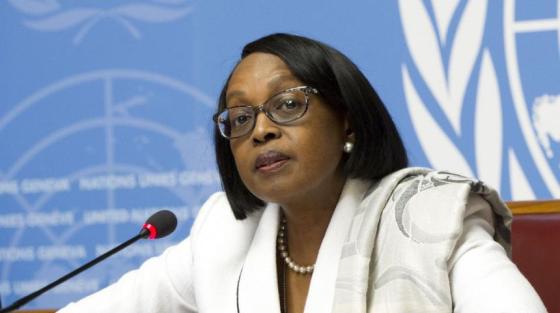World NTD Day - 30 January 2024: The Message of the WHO Regional Director for Africa, Dr. Matshidiso Moeti

Theme: Unite. Act. Eliminate
Today marks World Neglected Tropical Diseases (NTD) Day, a significant occasion to consider the severe effects these diseases have on the wellbeing and livelihoods of billions around the globe.
It's a time to reflect on the progress made in fighting these diseases and to recognize the urgent need for global and national authorities to reinforce their commitment and mobilize resources to accelerate elimination of NTDs globally and in Africa.
First, I, and my fellow leaders across Africa and the world, ask that we unite to tackle these devastating diseases, that affect the most vulnerable of our communities. The presence of NTDs is a constant reminder of the inequalities in our world today. Second, I am asking you, as individuals and as communities, to act, to spread awareness, to advocate with those in power, and to help to mobilize the resources needed to do this. And third, I am asking you to ensure that we eliminate – that we end – these diseases once and for all. Let’s build a world where no-one lives with river blindness, no-one is shunned by society because they are living with the ancient disease of leprosy, and no-one is debilitated by anaemia because they are infected with soil-transmitted worms.
Progress against NTDs is one of Africa’s greatest achievements. I am proud of the headway made by the WHO Regional Office for Africa, and by the Expanded Special Project for Elimination of Neglected Tropical Diseases (ESPEN), as well as the enormous support we have received from partners and governments. Together, we have made huge strides against these diseases. There are currently 18 million fewer people in Africa who require interventions against NTDs. Nineteen countries in the region have eliminated at least one NTD. Togo achieved a world first by eliminating four of these diseases – river blindness, elephantiasis, sleeping sickness and Guinea worm disease. Yaws is on the verge of being eliminated.
Ending these diseases is a ‘best buy’ for funding from partners, donors and regional governments. A key contributor to the successes we have seen so far has been successful public-private partnerships. Non-governmental development organizations and the Neglected Tropical Disease NGO Network (NNN) have played a crucial role through their advocacy, by developing and upholding best practices, and by contributing to WHO guidelines on NTD response. The donation of medications for mass drug administration by pharmaceutical companies has also been key. Research, development and innovation are vital enablers of the success of NTD elimination programmes, providing the foundation on which effective interventions can be designed and delivered.
Inrecenttimes, increased awareness of NTDs has led to better diagnosis and treatment for people living with the diseases, and prevention by controlling the vectors that carry NTDs – the teste flies, snails, worms and the animal reservoirs. Providing safe water supplies and sanitation is another essential action to prevent NTDs, which at the same time, improves people’s overall quality of life.
However, even with all this progress, Africa bears 40% of the global burden of NTD cases. We need to overcome the persistent challenges that are slowing progress in eliminating these diseases. Globally, we have clear roadmaps towards ending NTDs, Ending the neglect to attain the Sustainable Development Goals: a road map for neglected tropical diseases 2021-2030. To ensure that we put this road map into our context in Africa, the WHO Regional Office for Africa has provided guidance to countries through the WHO Regional NTD Road Map, helping affected countries to put together their own National NTD Masterplans. ESPEN publishes specific guidance and continues to provide dedicated help to countries to develop and use these plans. We must maintain the momentum of the progress made since the launch of the regional NTD roadmap in 2015.
The Kigali Declaration, last year, called for high-level commitment from governments and communities to pull together resources and action, putting individuals, communities and countries at the centre of the NTD response. To further to role of leadership in ending these diseases, I launched the Mwele Malacela Mentorship Programme for Women in NTDs, targeting young women scientists as future leaders in this endeavour.
In December last year, the United Arab Emirates, the Bill and Melinda Gates Foundation and other donors at the 2023 Reaching the Last Mile Forum at COP28 in Dubai, committed to investing more than US$ 777 million to boost efforts to end NTDs. WHO in Africa has also recently unveiled a new blueprint to drive the region’s strategy towards ending disease across Africa, anchored in the principals of universal health coverage and strengthening health systems.
Although commendable progress that has been made,we need to act, to ensure that high-level political commitment is translated into transformative action in the NTD space. We need to unite, by building new partnerships to ensure enough and sustainable funding to continue the momentum of the progress already made against these diseases. And we need to provide countries with the resources they require to eliminate these ancient diseases. I remain totally committed to supporting countries in our region in the commendable efforts to eliminate NTDs, once and for all.
